

Transforming Oncology with Innovative Approaches from Research to Treatment
Discover Glo 2023 - Biologically Relevant Models to Advance your Research
Join this year's hybrid event in person in Paris or join online
Promega cordially invites you to join us at the upcoming Discover Glo Conference, a free-of-charge premier event for the international scientific community to share knowledge and advancements in bioluminescent discovery tools and approaches for small molecules and biologics.
We are looking to offer a simultaneous in-person and virtual experience to delegates across Europe.
With a diverse lineup of international keynote speakers, cutting-edge presentations, and networking opportunities, this conference promises to be an invaluable opportunity for scientists, researchers, and industry professionals alike.
Mark your calendars and join us at l'Institut Curie in Paris for a truly inspiring and enlightening gathering. If you are unable to travel, why not sit back in your office, lab, or home and attend as an online delegate for this free-of-charge scientific event.
Tuesday 8 October 2024
09:00 - 17:00 hrs CEST Antwerp, Berlin, Madrid, Paris
08:00 - 16:00 hrs GMT London, Lisbon
This year's Discover Glo Conference is brought to you as a hybrid event. Join this scientific event in-person at the Institut Curie in Paris , or join the sessions online from the comfort of your lab or office.
Transforming Oncology with Innovative Approaches from Research to Treatment
Advancements in oncology research are increasingly driven by innovative tools that transition discoveries from basic research labs through drug discovery to translational applications. Among these, bioluminescent technologies stand out for their unique ability to bridge fundamental research and therapeutic solutions, providing highly sensitive assays and imaging techniques that enable non-invasive exploration of cancer cell dynamics.
By allowing for precise, real-time measurements of cell viability, proliferation, and pharmacological responses, bioluminescence is transforming the way we screen for new cancer-fighting compounds, unravel drug resistance, and assess the effectiveness of innovative treatments. During this event, leading experts will illuminate the scientific journey from bench to bedside, highlighting key advancements that are deepening our understanding of cancer biology and enabling novel strategies for detection, monitoring, and treatment, marking a significant leap forward in the fight against cancer.
Join us online
This year's Discover Glo Conference offers a full day of scientific talks delivered by renowned international speakers from across Promega and its customer network. If you can’t make the in-person event, please join us online for the day. You can chat, join discussions, and connect with the speakers and the other participants all from your laptop or phone.
You do not need specific software installed but you do need to use the link below to register. We’ll send you a link to join the meeting on Tuesday 8 October 2024.
This event is sponsored by Promega and offered to you free of charge.
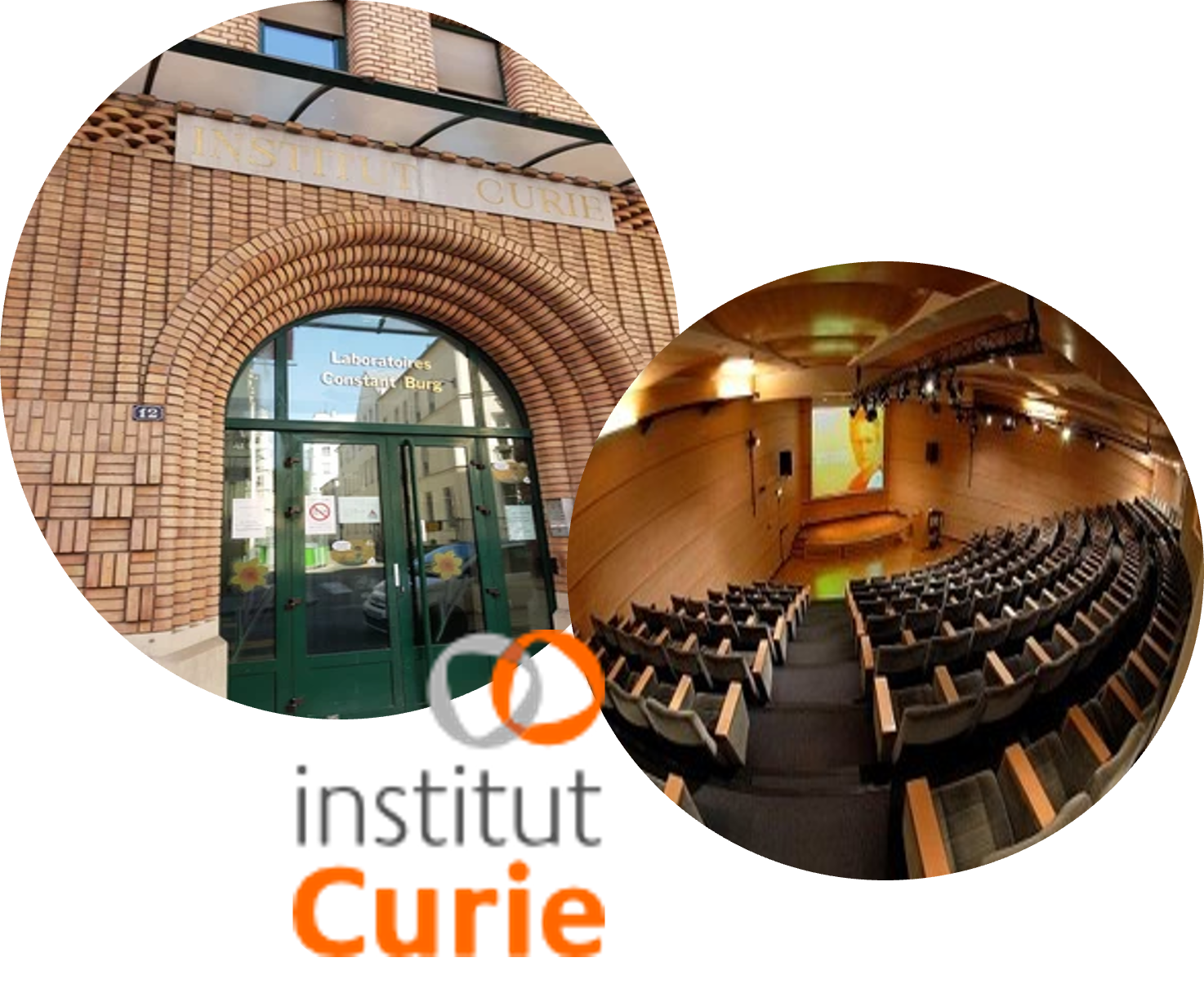
Institut Curie
Amphithéâtre Constant Burg
Join us in-person
You are Invited to Join Us In-Person at the Institut Curie in Paris
On Tuesday, October 8, 2024, we will be hosting a day filled with scientific presentations at the Institut Curie in Paris. We invite you to network with your peers from various countries throughout Europe. Our venue, the well-known Institut Curie, has a profound historical background and a rich legacy in science and research. You will catch a glimpse of this legacy.
On December 12, 1909, the University of Paris and the Institut Pasteur agreed to establish the Institut du Radium in honor of Marie Curie, who, together with her husband Pierre Curie and Henri Becquerel, received the Nobel Prize in Physics in 1903 for their discoveries in radioactivity. In 1970, the Institut du Radium merged with the Fondation Curie to form the Institut Curie, an institution committed to research, education, and patient care. This merge significantly evolved the institute, reinforcing its status as a premier center for cancer research and treatment.
We believe this venue will serve as an inspiring backdrop to discuss the latest advances in bioluminescent research during presentations, coffee breaks, and lunch.
This scientific gathering is generously sponsored by Promega and is open to delegates from across Europe, though space is limited. Attendance is complimentary and includes lunch, coffee, and refreshments. We encourage you to book early to secure your free place.
Paris– at the Heart of Europe and So Accessible
If you’d prefer to drive, there a number of local parking options.
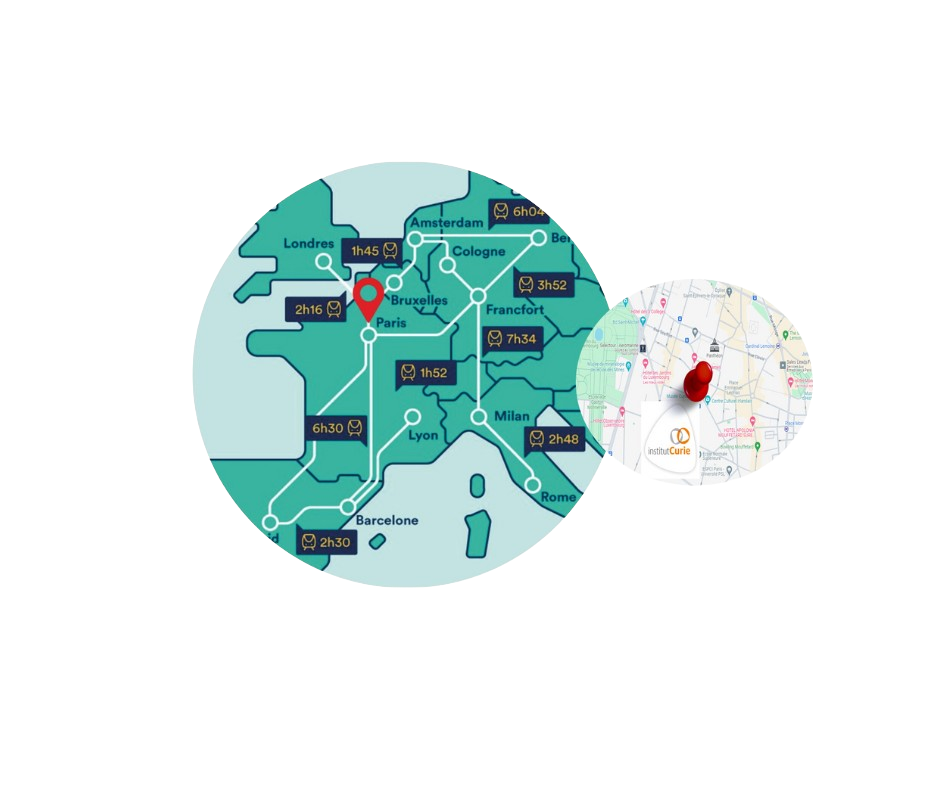
Agenda
Transforming Oncology with Innovative Approaches from Research to Treatment
Event Programme
| Time | Agenda |
|---|---|
| 09:00 - 09:20 | Welcome Coffee |
| 09:20 - 09:30 | Opening |
| 09:30 - 10:30 |
Session 1: Fundamental Research Eeson RAJENDRA PhD - Nanoluciferase-based assays to assess target engagement and inhibition by Polθ inhibitors Director of DDR Biology, Artios Pharma (UK) Muriel BARDOR PhD - Towards charaterizing the efficacy of microalgae-based antibodies directed again pediatric cancers using Glo Technologies Associate, Co-Funder & CSO, Alga Biologics |
| 10:45 - 12:30 |
Session 2: Drug Discovery Marie-Ange PEREIRA - Assay development for functional testing of UCART product and its starting material simplified by using Promega Tools Analytical Departement, Cellectis Maria CABALLERO PhD & Gema ROJAS - Building AI Predictive Tools for Drug Discovery Using HTS Viability Assay Data Drug Screening Platform & Predoctoral Researcher, Institute for Research in Biomedicine (Spain) Angela Bellini PhD - Luminescent Cell Viability Assay for Efficient Drug Sensitivity Testing in Tumor Cells Translational Research Department, Institut Curie |
| 12:30 - 14:00 | Lunch provided by Promega & Posters Presentations |
| 14:00 - 16:00 |
Session 3: Translational Research Jolanta VIDUGIRIENE - Adapting Glow: Leveraging Bioluminescence to Understand Cancer Cell Health and Metabolism R&D Assay Design & Sample Analysis, Promega Corporation (US) Jérôme CARTRY PhD - Towards Functional Precision Medicine: proliferation analysis during drug testing on Colorectal Cancer Patient-derived Organoids Research Engineer UMR 1279, Institut Gustave Roussy Sara VARRICCHIO - New cell line development for functional ADCC potency assay in QC batch analysis Biossay / Biology3 Lab Supervisor CMC Developement, Sanofi |
| 16:00 - 16:20 | Teasing Galaxy |
| 16:20 - 16:50 | Closing Key Note: AI applied to Promega R&D |
Speakers
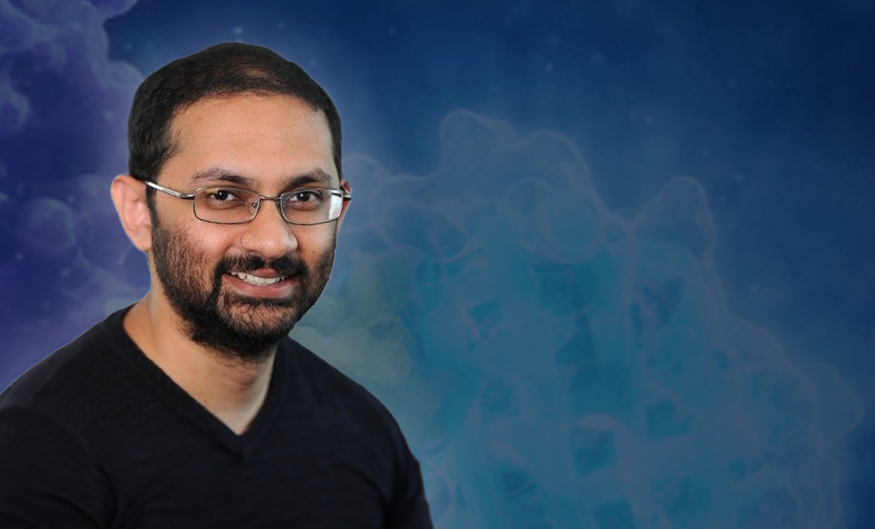
Eeson Rajendra, PhD
Director of DDR BiologyArtios Pharma
UK
Measuring on-target cellular activity is essential for the discovery and development of novel targeted therapeutics.
Suitable assays must be sensitive, titratable, amenable to high throughput formats, have a robust signal-to-noise ratio and be executable with a rapid turnaround time.
DNA polymerase theta (Polθ) is the key mediator of a DNA double strand break repair pathway (DSBR) pathway known as microhomology-mediated end joining. In this seminar, the implementation of Nanoluciferase-based cellular assays for the discovery and characterisation of small molecule inhibitors of Polθ will be presented.
Firstly, the generation, validation and applications of a suite of extrachromosomal reporter assays that can efficiently measure the four major DSBR pathways will be outlined. These assays provide mechanistic and quantitative insights into compound potency, selectivity, and on-target specificity.
Secondly, a recently developed NanoBRET assay will be described. This system not only demonstrates target engagement but provides insight into the mechanism of enzymatic inhibition by Polθ inhibitors.
Together these assays characterise the pharmacological modulation of Polθ and provide a framework for using cellular assays to prosecute drug discovery campaigns against DNA damage response factors.
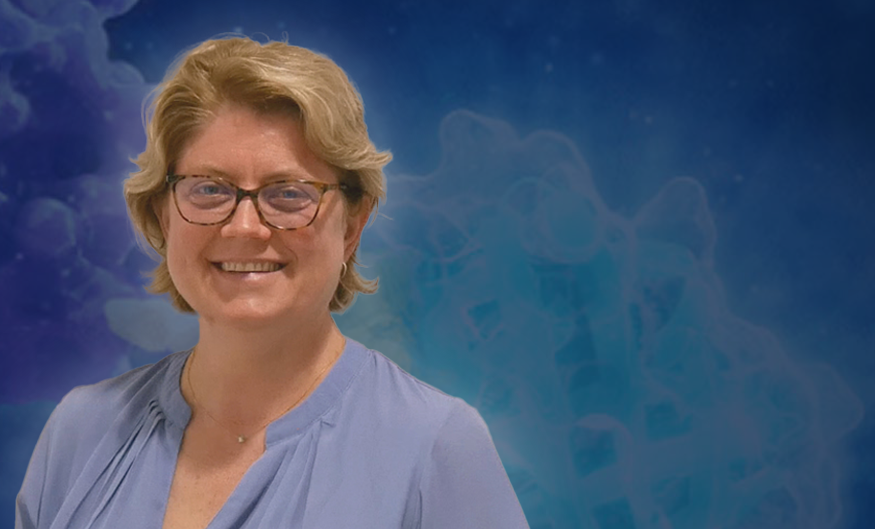
Muriel Bardor, PhD
Associate , Co-Funder and CSOAlga Biologics
France
Towards charaterizing the efficacy of microalgae-based antibodies directed again pediatric cancers using Glo Technologies
The rising incidence of diseases such as cancers, autoimmune diseases, and infectious diseases has significantly increased the demand for innovative antibody drugs. This market, growing at an annual rate of 20%, is projected to be worth $300 billion by 2027. Currently, these antibodies are produced using mammalian cells, which involves high production costs, production variability, instability, and potential pathogen contamination, limiting access to only 5% of the global population.
ALGA BIOLOGICS is addressing these challenges by developing a platform to produce antibodies using the microalga Phaeodactylum tricornutum. This method has successfully produced functional antibodies against viruses like Hepatitis B and Marburg. Currently, ALGA BIOLOGICS is producing an antibody targeting pediatric neuroblastoma, a cancer affecting 25,000 children globally with a survival rate below 50%.
This presentation will showcase the functional characterization of the microalgae-made antibody using Promega Lumit technologies. ALGA BIOLOGICS is supported by the French government’s France 2030 program and the ADD from BPI France.
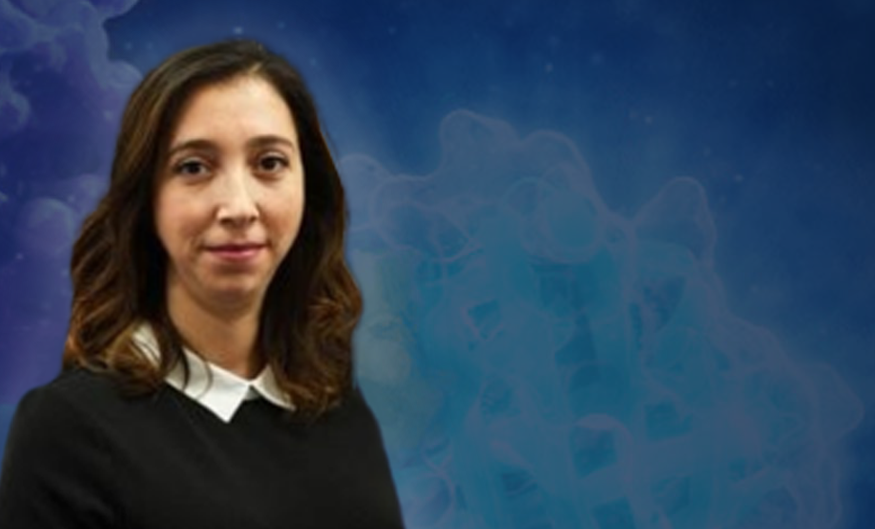
Marie-Ange Pereira
Analytical DepartmentCellectis
France
Marie Ange is a Senior Engineer in Analytical Development Team, focusing on cell-based assays. She has over 26 years of experience in biotechnology sector, of which she spent over 18 years at Cellectis.
Her work focuses on assay development, pre-qualification according to Regulatory Agencies guidelines and subsequent assay transfer to QC-lab (GMP-environment).
The portfolio of her methodological experience includes among others: cell line engineering, T-Cell proliferation, Cytotoxicity and Cytokine secretion assays, flow cytometry, rLV production and titration.
Allogenic CAR T-cell therapy has emerged as a powerful approach to treat hematological cancer entities and currently efforts in the field aim to broaden the application of CAR T-cell therapy to solid tumors and autoimmune diseases as well. We at Cellectis, have successfully developed GMP-compliant manufacturing TALEN®-edited CAR T-cells for clinical use.
This presentation focuses on our allogeneic UCART platform and quality control approach for starting material and final UCART drug product. We developed and successfully pre-qualified in R&D environment a robust QC assay to test functionality of the starting material rLV, used for UCART transduction, applying the Promega tools TCR/CD3 Effector Cells NFAT and the Bio-Glo™ Luciferase Assay System. Furthermore, we show that using the RealTime-Glo™ MT Cell Viability Assay reagent allows reducing some handling steps. For functional testing of UCART product we leveraged the NanoGlo® Luciferase system to develop a user-friendly and robust assay to test for cytotoxic activity, which was successfully transferred as QC assay and qualified in GMP environment according to the ICH guidelines Q2(R2).
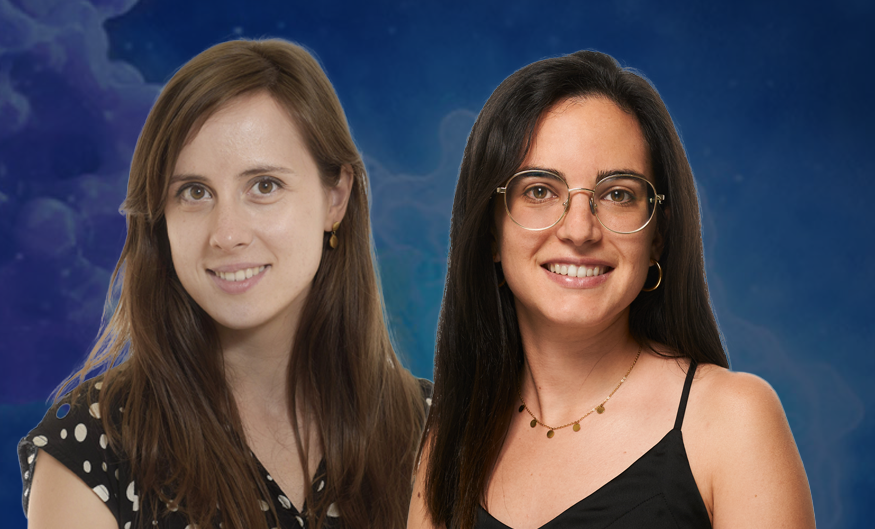
Maria Caballero PhD / Gema Rojas
Drug Screening Platform & Predoctoral ResearcherInstitute for research in Biomedicine
Spain
Dr. Maria Caballero, biologist with a Ph.D. in Biomedicine and extensive expertise in drug discovery, specializing in the development of assays for diverse targets and phenotypes, applying a broad spectrum of cutting-edge technologies. Over the past two years, she has served as research officer in the drug-screening platform at the Institute for Research in Biomedicine (IRB) Barcelona. In this role, she has gained substantial experience running High Throughput Screenings (HTSs) campaigns, providing pivotal support for scientific projects, and conducting characterizations of compounds.
Gema Rojas obtained her bachelor's degree in Biomedicine from the University of Seville and completed her MSc in Bioinformatics at the Autonomous University of Barcelona.She worked as a data scientist at Leitat technological center for 1.5 years and then joined the Institute for Research in Biomedicine (IRB) in Barcelona to pursue her PhD in 2021. Her research focuses on developing new methods for drug repurposing and drug development by leveraging artificial intelligence and drug bioactivity descriptors.
Building AI Predictive Tools for Drug Discovery Using HTS Viability Assay Data
Our research explores the use of generative chemistry models and compound bioactivity descriptors for phenotype-based drug design, focusing on the discovery of new small molecules that show a specific cytotoxicity profile. To achieve this goal, first we conducted a high throughput screening (HTS) of over 11.000 compounds on six pancreatic cancer cell lines, evaluated using CellTiter-Glo® from Promega. We used this data to train machine learning models for cytotoxicity prediction, using compound bioactivity descriptors as input features. We ran predictions on our in-house library of 50.000 molecules and experimentally tested 320 of them for validation, achieving an exceptional 20-fold increase in hit discovery rate compared to previous HTS (OR=20, p < 0.001).Finally, we integrated our prediction algorithms with a generative model (REINVENT 3.2) to guide the design of new molecules towards seven specific cytotoxicity profiles, targeting one cell line without affecting another. We successfully generated molecules matching the desired profiles in five of the seven exercises, with superior hit ratios in four of them compared to the HTS (>200 folds). This approach significantly enhances selective cytotoxicity hit rates, demonstrating the effectiveness of AI models in discovering new chemical structures with targeted phenotypes.
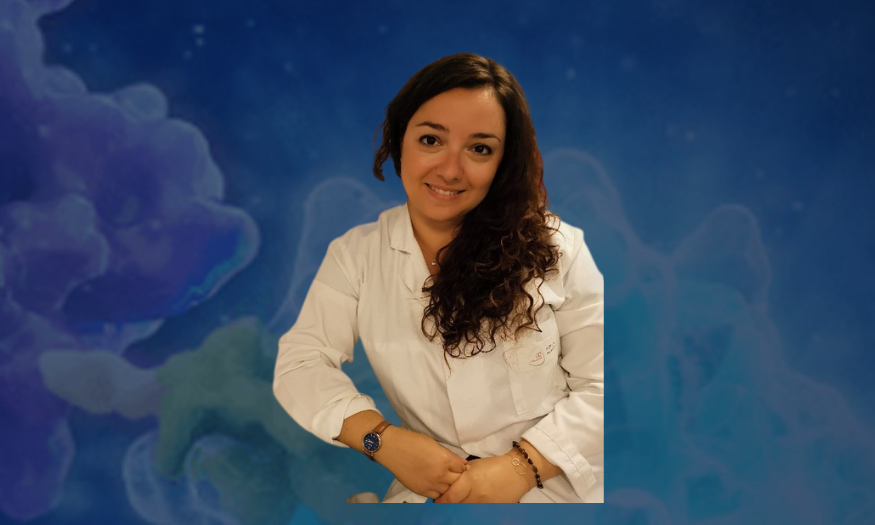
Angela Bellini PhD
Research Engineer at the RTOP teamCurie Institute
France
Angela studied Molecular Biology at the University of Pavia, Italy. She completed her PhD in Molecular and Cellular Biology at Institut Curie in the Biology of radiations Group in 2012. She joined SIRIC U830 Unit (RTOP team – translational research in paediatric oncology) as a research engineer in 2013.
Her main contributions to Neuroblastoma translational research focus on the characterisation of ALK activating mutations in a large cohort of high-risk Neuroblastoma patients. In addition, she also studies genomic SNVs and copy number profiles in genes involved in RAS-MAPK pathways and in a panel of genes having an oncogenic role in Neuroblastoma.
Other projects focus on drug screen responses in a panel of NB cell lines and NB PDX models established at institute Curie. Ongoing work aims to further investigate drug response in spheroids derived from PDX and patients’ models. The final aim is to establish a drug sensitivity and resistance platform for personalized drug sensitivity profiling in paediatric oncology precision medicine.
In the pursuit of advancing cancer therapeutics, particularly for pediatric oncology, we have optimized luminescent cell viability assay protocols for high-throughput screening platforms. This metabolic assay enables the rapid and efficient identification of small molecule compounds that significantly impact cell viability in various pediatric cancer cell models. By leveraging the sensitivity and precision of luminescence-based detection, we obtain a reliable measure of cell health and viability, facilitating the discovery of potential therapeutic agents. This high-throughput approach not only accelerates the screening process but also enhances the accuracy of identifying compounds with potential clinical applications. Our findings underscore the assay’s potential in streamlining drug sensitivity testing, ultimately contributing to the development of targeted cancer treatments.
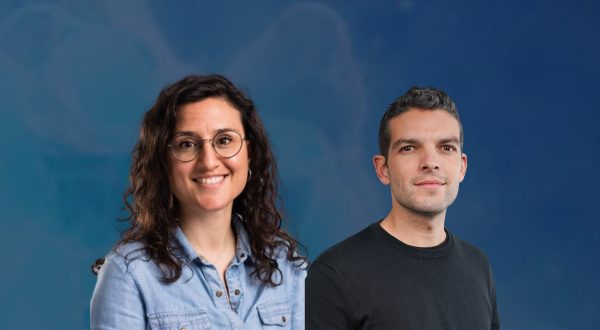
Sara Varricchio & Florian Mignot
Biossay / Biology3 Lab Supervisor CMC Development - Cell Based Assay SpecialistSanofi - Promega France
France
Sara Varricchio has been working at Sanofi R&D in Vitry-sur-Seine since 2015, spe- cializing in the analytical development and validation of biological assays, including ELISA and cell-based assays, for QC analysis of biologics. She graduated in Chimica e Tecnologia Farmaceutiche from the University of Naples “Federico II,” Italy, and spent six months at the Faculté de Pharmacie at the University of Montpellier, France, during her studies. Prior to joining Sanofi, she gained valuable experience in various R&D pharmaceutical contexts in Italy, including Bracco in Ivrea and Trieste (2008-2010) and Novartis Vaccines in Siena (2010-2014), where she was involved in biological method development and validation for QC control of new vaccines.
Florian Mignot is a cell-based assays specialist in the Technical and Application Support team at Promega France. With a background in Biotechnology and Microbiology, he started his career by studying a signaling pathway for antibiotic production in Streptomyces bac- teria at the University of East Anglia, Norwich, UK. Then, he developed bioluminescence biosensors using a luciferase reporter system to monitor the presence of heavy metals in the environment (CEA, Aix-Marseille University). As part of Promega France for more than 13 years, he started as Key Account Manager and is now Product Manager with the main mission to facilitate the adoption of future technologies in cellular analysis with a focus on bioluminescence, whether for drug discovery, biomedicine or for the development of vaccines and anti-virals.
New cell line development for functional ADCC potency assay in QC batch analysis
Due to their high degree of complexity, the analysis of biomedicines requires a comprehensive set of quantitative, reliable, reproducible and precise tools. The development and validation of analytical methods in line with ICH guidelines is an essential requirement for meeting the expectations of health authorities and obtaining analytical methods suitable for batch release in quality control. Bioassays, based on gene reporter cell lines or others, enable the functional study of biomedicines in relation to their mechanism of action, and thus characterize new innovative therapies such as monoclonal antibodies.
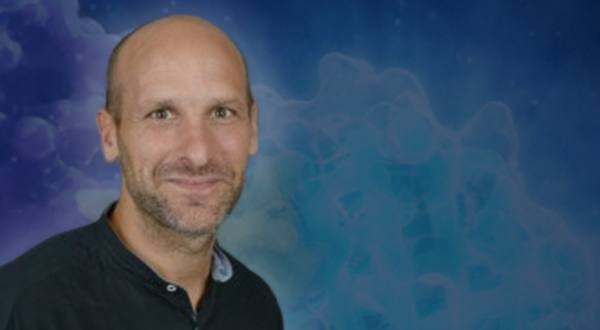
Jérôme Cartry PhD
Research Engineer UMR 1279Institut Gustave Roussy
France
Jérôme Cartry earned his PhD in Developmental Biology from Université Paris VI (Jussieu) in 2008, and furthered his research on genetic cardiac function at Sanford Burnham Prebys Medical Discovery Institute, San Diego. At Gustave Roussy Institute since 2015, he transitioned from a clinical research associate to a lab engineer in the Jaulin lab, focusing on translational research. Cartry's work employs organoid technology for developing personalized cancer therapies, aiming to closely align laboratory findings with clinical treatments to improve patient outcomes in oncology.
Cancer is a complex and heterogeneous disease that warrants modelling and treatment specific to each individual. Over the last decade, a rapid accumulation of evidence has demonstrated́ that organoids are excellent biological avatars of healthy and pathological organs (PDOs for Patient Derived Organoid). In cancer patients, PDOs can be generated from tumour biopsies or surgical specimens. They summarise the molecular and phenotypic characteristics of the original tumour. Several observational studies have shown that PDOs faithfully recapitulate patients’ clinical responses to chemotherapy and targeted therapies. This work paves the way for PDOs to be used to analyse the sensitivity of each patient’s tumour to a large number of drugs and thus identify, in a personalised way, the most effective treatments. Currently, the gold standard for analysing the effect of drugs on PDOs relies on a viability test based on ATP-bioluminescence (CellTiter-Glo, Promega). In addition to this test, it would be useful to obtain data on the proliferative state of PDOs. To this end, we tested Promega’s Lumit Ki-67 kit alongside CellTiter-Glo. We present the results obtained on several PDO lines subjected to a panel of drugs.
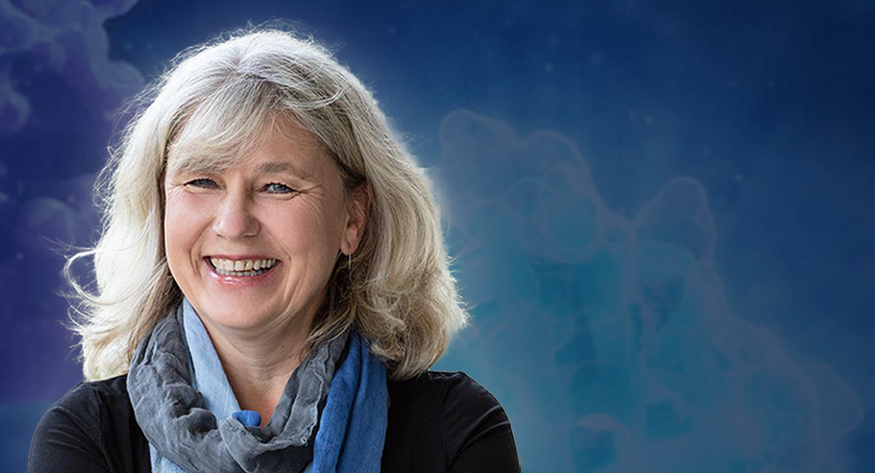
Jolanta Vidugiriene
R&D Assay Design & Sample AnalysisPromega Corporation
USA
Jolanta Vidugiriene is a Group Leader in R&D at Promega leading development of new technologies for mechanistic studies of cell survival and adaptation, particularly those involved in regulation of cellular energy metabolism. Prior to joining Promega, Jolanta was a Principal Investigator of a Howard Hughes International Grant, where she conducted collaborative research between the Department of Biochemistry, University of Wisconsin-Madison and Vilnius University, Lithuania. Jolanta received her Ph.D. in biochemistry from Vilnius University, completed post-doctoral studies at Boston Biomedical Research Institute and Laboratory of Molecular Parasitology, Rockefeller University.
Leveraging Bioluminescence to Understand Cancer Cell Health and Metabolism
The health and energy metabolism of cancer and immune cells are pivotal in defining their functions and treatment responses. Understanding these parameters is essential for advancing therapeutic strategies. Our research focuses on developing bioluminescent tools, adapting the natural «glow» of bioluminescence to provide deeper insights into cellular metabolism and health.
In this presentation, we will discuss the significance of cellular metabolism in cancer and immune cells. We will demonstrate how our bioluminescent tools can be utilized to study complex biological responses, such as the transition of immune cells from a quiescent to an activated state. Furthermore, we will explore how medium constituents modulate metabolic attributes, underscoring the intricate relationship between metabolic pathways and the extracellular environment in which these cells reside. We will also highlight the utility of monitoring changes in dehydrogenase activity, which regulate key metabolic pathways, as a means to determine the metabolic profile of cell populations. Additionally, we will showcase the flexibility of our assays in detecting multiple metabolites from the same sample and their suitability for high-throughput applications in various volumes and low cell numbers.
